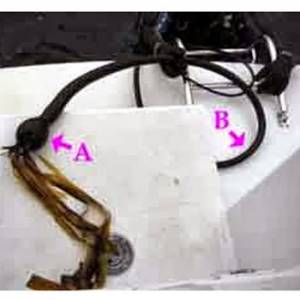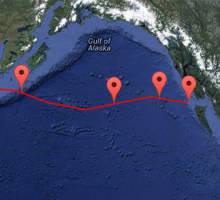
SV Traversay III - North West Passage/Fooled by a plant
ALL OF A SUDDEN: a huge Bull Kelp floats out from under the hull. It was attached in a few places by the stipe (B) which was caught on a zinc and also in the propeller. Our marine I.D. book <<Marine Life of the Pacific Northwest>> says that the "pneumatocyst (A) contains carbon monoxide and was used by coastal First Peoples as a storage container for water and fish oil." This float acted like a drum and was banging against the hull. We thought it sounded like a man-made lobster buoy! The kelp was only held in place by the motion of the boat, so once we stopped the motion it disentangled itself and floated out.
STEPS TO CLEAR THE PROPELLER:
1. Outside Forward Locker: we remove the 2 large orange and 5 small fenders (used to protect us when tied to other boats or a dock) and stow them safely on deck so Larry can remove a SCUBA tank from the bottom of the locker; Inside forward Cabin: Larry removes his "wooly bear" underwear (used under the dry suit) from underneath the bed; Inside aft Equipment room: we remove his dive gear and suit
2. On deck we lie a-hull to stop the motion: Haul up lazy jacks; furl genoa sail; drop mainsail; disengage auto pilot so boat gradually turns broadside to the waves; steer rudder perpendicular to waves;
3. In the cockpit: cast off attached floating line safety]; assemble dive gear; Larry dons drysuit; we do an equipment check
4. Larry jumps into the water
5. The huge kelp is freed
APOLOGIES: to Gulf fishermen for accusing them of leaving their gear lying around to entangle innocent sailboats!
Our book (produced by friends Andy Lamb and Bernhard P Hanby) goes on to state that the Bull Kelp is an "annual" and is one of the fastest growing plants in the world. It reaches its full size in June. It can grow to 20m (65 ft). This one did its job (giving a protective habitat for young fish and other animals).
It then decided to retire and go off-shore (just like us). And that's how we met. So we can hardly blame it!
At 19/10/2013 15:35 (utc) our position was 54°21.89'N 133°57.41'W


